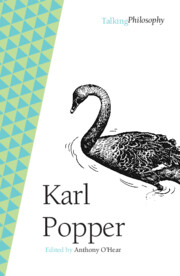Book contents
- Karl Popper
- Talking Philosophy
- Karl Popper
- Copyright page
- Contents
- Contributors
- Preface
- Introduction
- 1 Popper, Science and Rationality
- 2 Popper and Reliabilism
- 3 The Problem of the Empirical Basis
- 4 ‘Revolution in Permanence’: Popper on Theory-Change in Science
- 5 Popper’s Contribution to the Philosophy of Probability
- 6 Propensities and Indeterminism
- 7 Popper on Determinism
- 8 Popper and the Quantum Theory
- 9 The Uses of Karl Popper
- 10 Popper and Darwinism
- 11 Popper and the Scepticism of Evolutionary Epistemology, or, What Were Human Beings Made For?
- 12 Does Popper Explain Historical Explanation?
- 13 The Grounds for Anti-Historicism
- 14 What Use is Popper to a Politician?
- Works of Karl Popper Referred to in the Text
- Index
7 - Popper on Determinism
Published online by Cambridge University Press: 25 April 2024
- Karl Popper
- Talking Philosophy
- Karl Popper
- Copyright page
- Contents
- Contributors
- Preface
- Introduction
- 1 Popper, Science and Rationality
- 2 Popper and Reliabilism
- 3 The Problem of the Empirical Basis
- 4 ‘Revolution in Permanence’: Popper on Theory-Change in Science
- 5 Popper’s Contribution to the Philosophy of Probability
- 6 Propensities and Indeterminism
- 7 Popper on Determinism
- 8 Popper and the Quantum Theory
- 9 The Uses of Karl Popper
- 10 Popper and Darwinism
- 11 Popper and the Scepticism of Evolutionary Epistemology, or, What Were Human Beings Made For?
- 12 Does Popper Explain Historical Explanation?
- 13 The Grounds for Anti-Historicism
- 14 What Use is Popper to a Politician?
- Works of Karl Popper Referred to in the Text
- Index
Summary
There is no doubt at all that the issue of determinism versus indeterminism was a central, dominating theme of Popper’s thought. By his own account he saw his criticism of the thesis of determinism as crucial to his defence not only of the reality of human freedom, moral responsibility and creativity but also as equally fundamental to his account of human rationality and to his theory of the content and growth of science as an objective, rational and most importantly demonstrably rational enterprise. Consequently a great deal of his writings discussing both the content and methodology of the natural and the social sciences alternately bear upon and presuppose his defence of indeterminism.
- Type
- Chapter
- Information
- Karl Popper , pp. 236 - 258Publisher: Cambridge University PressPrint publication year: 2024

